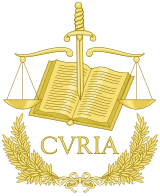European Court of Justice says Facebook must remove 'illegal' posts globally
Sunday, October 6, 2019
On Thursday, the European Court of Justice (ECJ) — the supreme court on matters of European Union (EU) law — ruled in regard to the case "Eva Glawischnig-Piesczek vs. Facebook Ireland Limited". The Luxembourg-based court issued a judgement favorable to the plaintiff, Eva Glawischnig-Piesczek, a politician in Austria, allowing an Austrian court to require social media site Facebook to remove a post from its site made by a user in Ireland. The ruling made proclamations which analysts say could have far-reaching implications for regulation of content on the Internet beyond the borders of the EU. The court's decision cannot be appealed.
In 2016, a Facebook user registered from Ireland shared publicly a news article from the Austrian news site oe24.at along with some comments of their own. The post, which was about Eva Glawischnig-Piesczek, the then chair and spokesperson for The Greens, could potentially be seen by anyone with access to Facebook. The comments called her political party facsist and termed her a "corrupt oaf" and a "lousy traitor".
Glawischnig-Piesczek sued in Austria for defamation and won. Facebook was ordered to remove the post which it did by making it unavailable to view in Austria only. This apparently did not appease Glawischnig-Piesczek. As a result, the Supreme Court of Justice (Oberster Gerichtshof ) of Austria brought the case before the ECJ, asking for clarifications of EU law.
The EU law Electronic Commerce Directive 2000 provides liability protections for hosting sites. In its finding, the ECJ set rules for compliance with rulings from a court from any EU member nation for any website which hosts user content:
By today’s judgment, the Court of Justice answers the Oberster Gerichtshof that the Directive on electronic commerce, which seeks to strike a balance between the different interests at stake, does not preclude a court of a Member State from ordering a host provider:
- to remove information which it stores, the content of which is identical to the content of information which was previously declared to be unlawful, or to block access to that information, irrespective of who requested the storage of that information;
- to remove information which it stores, the content of which is equivalent to the content of information which was previously declared to be unlawful, or to block access to that information, provided that the monitoring of and search for the information concerned by such an injunction are limited to information conveying a message the content of which remains essentially unchanged compared with the content which gave rise to the finding of illegality and containing the elements specified in the injunction, and provided that the differences in the wording of that equivalent content, compared with the wording characterising the information which was previously declared to be illegal, are not such as to require the host provider to carry out an independent assessment of that content (thus, the host provider may have recourse to automated search tools and technologies);
- to remove information covered by the injunction or to block access to that information worldwide within the framework of the relevant international law, and it is up to Member States to take that law into account.
– European Court of Justice
According to the ruling, a host, such as Facebook, must remove the original post as well as re-posts and posts which state essentially the same thing if it is deemed against the law. Steve Peers of the University of Essex, speaking to BBC, said, "If there's a court order to say that someone's been defamed, then Facebook has to also search for different variations of it", also observing, "[t]here's no harmonised defamation law internationally".
Jennifer Daskal of American University and contributor to Slate wrote, "a single EU country (in this case Austria) could demand an online provider (in this case Facebook) to take down an objectionable post, monitor its site for equivalent content, and take down those postings as well. And it says a country could do so on a global scale, regardless of where the poster or the viewer is located. In so ruling, the court demonstrated a shocking ignorance of the technology involved and set the stage for the most censor-prone country to set global speech rules."
Facebook released a statement which read, in part, "This judgment raises critical questions around freedom of expression and the role that internet companies should play in monitoring, interpreting and removing speech that might be illegal in any particular country". Facebook further claimed, "It undermines the long-standing principle that one country does not have the right to impose its laws on speech on another country".
Sources
- Chris Isidore and Hanna Ziady. "A court ordered Facebook to take down a post. The decision could affect social media around the world" — CNN, October 3, 2019
- Chris Fox. "Facebook can be ordered to remove posts worldwide" — BBC News Online, October 3, 2019
- Jennifer Daskal. "A European Court Decision May Usher In Global Censorship" — Slate, October 3, 2019
- "EU law does not preclude a host provider such as Facebook from being ordered to remove identical and, in certain circumstances, equivalent comments previously declared to be illegal" — European Court of Justice, October 3, 2019 (PDF)
External links
- "List of documents related to Case number C-18/18" — European Court of Justice, October 4, 2019 (date of access)





